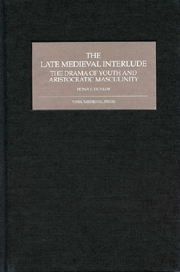Book contents
- Frontmatter
- Contents
- Dedication
- Acknowledgements
- List of Abbreviations
- Introduction: The interlude as a literary genre
- 1 Defining Youth
- 2 Young Masculinity and Late Medieval Discourses of Youth
- 3 Noble Masculinity in the Interludes
- 4 Interludes and the Politics of Youth
- Conclusion
- Bibliography
- Index
- YORK MEDIEVAL PRESS: PUBLICATIONS
2 - Young Masculinity and Late Medieval Discourses of Youth
Published online by Cambridge University Press: 05 February 2013
- Frontmatter
- Contents
- Dedication
- Acknowledgements
- List of Abbreviations
- Introduction: The interlude as a literary genre
- 1 Defining Youth
- 2 Young Masculinity and Late Medieval Discourses of Youth
- 3 Noble Masculinity in the Interludes
- 4 Interludes and the Politics of Youth
- Conclusion
- Bibliography
- Index
- YORK MEDIEVAL PRESS: PUBLICATIONS
Summary
Derek Neal has recently defined a masculinity as ‘a set of meanings […] grounded in the male body’. As argued in the previous chapter, medieval descriptions of men's development might start from the empirical observation of male bodies and attempts to account for the phenomena of ageing; but they do not end there. The interludes work from a more or less objective model of a typical male life-span (though the precise nature of the relationship between generalizing models and the ‘reality’ of individual bodies is open to debate); but they map onto that model other cultural and social assumptions about men, and so make them seem ‘natural’ and obvious. The ‘set of meanings’ implied in the young male characters of the interludes can only be understood in the context of late medieval discourses of youth which had already invested young male bodies with multiple significance. As the present chapter shows, not all the play-texts under discussion in this book endorse these meanings; some deliberately contest and disrupt them.
Young men and sinfulness
Late medieval devotional and morally didactic works tend to associate young men with the sinful state. Frequently used to represent the fallen state of the human race, young men are depicted as devoted to the pleasures of this world, rather than to a life of prayer and self-examination in preparation for the world to come. This association is the product of a moral discourse which refers to male bodies in order to explain human nature.
- Type
- Chapter
- Information
- The Late Medieval InterludeThe Drama of Youth and Aristocratic Masculinity, pp. 22 - 53Publisher: Boydell & BrewerPrint publication year: 2007



